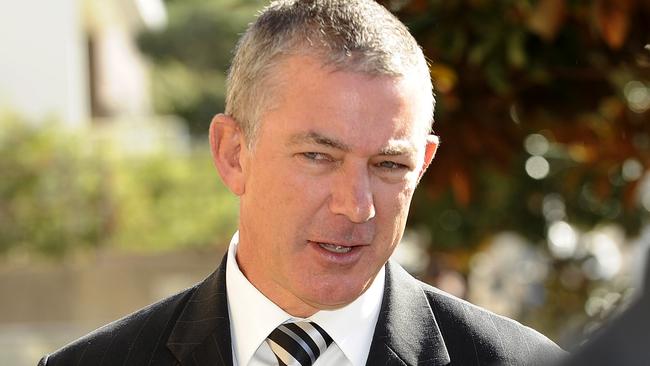Counting the cost after inquiry rules on whistleblower claims
COMMISSION finds no evidence of a ‘Catholic mafia’ in the police force.

OUTSIDE the office of the Catholic bishop of Maitland-Newcastle, in NSW’s Hunter Valley, hangs a sepia portrait of his predecessor, Leo Clarke, the bishop who protected a pedophile priest.
The late, bespectacled bishop’s repeated failure to report his knowledge of child abuse to police over several decades from 1976 was “inexcusable”, according to the final report of an 18-month state inquiry, handed down last week. Yet the portrait will remain.
“I would strongly oppose removing Bishop Clarke’s portrait, because you are almost then trying to censor history. He is part of this story,” says Sean Tynan, manager of the diocese’s child protection service.
This small but significant decision is just one part of the reckoning forced on the diocese by the findings of the NSW special commission of inquiry. Nor is the church alone; the local police force and others associated with the “whistleblower” detective who provoked the inquiry are only now beginning to count the cost.
The inquiry was established in November 2012, after serving NSW Police Detective Chief Inspector Peter Fox went live on ABC’s Lateline program with sweeping claims about both the church and his force’s failure to deal with child abuse.
While apparently sensational, the inquiry’s four-volume report finds much of what Fox claimed was wrong.
“I can testify from my own experience the church covers up, silences victims, hinders police investigations, alerts offenders, destroys evidence,” Fox told Lateline during the original broadcast. “Not only do I have evidence, it’s irrefutable.”
In contrast, having challenged the detective to provide specific claims, the inquiry finds “there was no basis for Fox’s assertions of collusion, concealment and lack of assistance” against many of those he named.
More damningly, Fox himself became “a zealot”, obsessed with conspiracies, who “exaggerated” his own importance and gave “deliberately untruthful” evidence to support his claims.
Certain members of the clergy, including Clarke, did deliberately conceal their knowledge of abuse, the inquiry finds, and many other children suffered as a result. Yet, even after up to 18 of the inquiry’s staff spent a week picking through the diocese’s paper records, little evidence emerged of the grand, all-encompassing conspiracy Fox suggested.
In fact, the diocese — driven by public pressure and a series of more recent police investigations — began to face up to this issue many years ago.
In 2005, the diocese established its child protection unit, now called Zimmerman Services, whose work has been praised by both the inquiry and local police. More than 160 child victims of five known diocesan priests have since been identified, with the most recent substantiated allegation of abuse dating back to 1995.
To date, the diocese and its insurer have spent more than $22 million reaching settlements with these victims, most of it paid out before the November 2012 Lateline broadcast went to air.
Despite this, the effect of Fox’s very public claims is that many serving priests in Maitland-Newcastle have been called “pedophile” in the streets, according to the incumbent bishop, Bill Wright. Now that the inquiry has reported, they and their diocese have to pick themselves back up.
“When all the lights and hullabaloo are gone … we are still going to be here, addressing our past and we are still going to be dealing with victims,” Tynan says.
Yet Fox, unfortunately, went further. During the live interview, he took aim at his own police force, claiming he was inappropriately “ordered to stand down” from investigating child abuse committed by a priest.
“He also made allegations to the effect that there existed … a group of senior police who were concerned to ensure that there be no investigation, or no proper investigation, of child sexual assault associated with the Catholic Church,” the inquiry finds.
His claims may have been massively damaging to the police. Under cross-examination at the inquiry, Fox provoked further front-page headlines by claiming a “Catholic mafia” existed among police ranks, and that in particular Strike Force Lantle, ostensibly meant to investigate the cover-up of church child abuse was “a sham … set up to fail”.
In its report, the inquiry rejects all of these claims. The Lantle investigation was “of a high standard” and there is “no credible evidence” that senior police were prepared to prevent proper investigation of child abuse involving priests, it says.
“No direction or instruction was issued to Fox that he was to cease investigating church pedophilia generally,” the inquiry finds, and his superiors were correct not to appoint him to the Lantle investigation in the first place.
The truth of the situation is that NSW Police have repeatedly investigated church child abuse in the Hunter Valley region, charging more than a dozen clerics in recent years, including one as recently as this week.
Yet Fox’s claims have meant the Lantle investigation, at least, was stalled. Far from being a “sham”, the strike force had, a month before the Lateline broadcast, sent a brief of evidence to the NSW Director of Public Prosecutions to consider possible criminal charges.
Under the cloud of Fox’s public criticism, that decision was delayed until the 18-month inquiry could be completed, and only now will any such judgment be made.
What may also never be properly understood is the effect Fox’s words had on other abuse victims who — fearing the existence of a “Catholic mafia” — may hesitate to approach the police. As a consequence, it is possible some criminals may never face justice.
Today, no one in NSW Police will publicly say a word against Fox himself.
“I don’t want to focus on how we got to where we got,” Commissioner Andrew Scipione said during a visit to the region earlier this week. “What I want to focus on now is that we continue to show that people should have confidence in the NSW Police.”
Fox’s defenders also argue that without him speaking out there may never have been the NSW inquiry, nor the national royal commission into child sexual abuse, both of which have done fine work.
But “the end doesn’t justify the means”, says one detective, speaking privately. “If it did, I’d tell all my guys to go back to hitting people with phone books, because, believe me, we got good results.”
Fox himself has declined to comment to The Weekend Australian. In an interview with Lateline after the inquiry published its report, he remained defiant, saying: “I am not backing away from any of the things I said … on the Lateline program.
“That triggered everything and I don’t think anywhere through the special commission anything that I said (on air) … has been cast into any sort of doubt.”
Others may also have been injured in the fallout from the inquiry’s report, such as those media organisations — including, initially, this newspaper — that uncritically reported Fox’s claims, swiftly anointing him a “hero cop”.
One journalist who has had a long association with the detective is Newcastle Herald reporter Joanne McCarthy, who won a Gold Walkley journalism award in 2013 after years of campaigning work uncovering church child abuse within the Hunter Valley. Interviewed by Lateline in the aftermath of the inquiry report, McCarthy distanced herself from the policeman’s claims.
“Certainly some of his comments did not stand up to any sort of challenge, and certainly along the way I became aware, even in his communications with me, that when I actually checked on things, they didn’t quite stack up.
“But do I have sympathy with somebody who becomes obsessive, who loses objectivity in this area? Yes, I do. Because you’re dealing with really serious offences, distressing, devastating offences against children.”
McCarthy declines to comment to The Weekend Australian, other than to point to the inquiry’s report, which finds she played a key role in providing police with the information that led to the establishment of Strike Force Lantle.
“The evidence suggests that McCarthy was generally determined to provide police as much information as possible so as to assist with the investigation of church concealment allegations,” the inquiry finds.
While Fox’s own past conduct in leaking confidential police information to McCarthy was “objectionable and inappropriate” on his part, the inquiry “does not regard (her) conduct as having been in any way improper”.
Then there is Lateline itself, the national broadcaster’s flagship program, which also won a Walkley for its interview with Fox.
Neither the program nor the ABC is criticised in the inquiry report, yet it remains the case a serving officer was allowed to go on air with claims for which the inquiry finds there is “no credible evidence”.
Does the ABC today stand by the broadcast? In a written reply to questions, a spokeswoman says the ABC is “not responsible” for Fox’s views, but the broadcast itself “raised important and legitimate issues”.
“It was both editorially justified and in the public interest to interview a senior NSW policeman with direct experience of investigating church-based sexual abuse cases, especially given that he had criticism to make about the lack of prosecutions or outcomes,” the spokeswoman says.
“The ABC is not responsible for the views of any interview subject but stands by the broadcast of the interview as manifestly in the public interest.”



